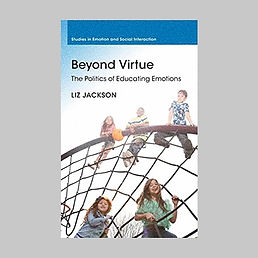
Past Event
Theorizing Care:
A Humanities Online Reading Course
Session Seven|10 AUGUST 2023|4-6pm (HKT)

Session
Leader

Professor
Department of International Education
The Education University of Hong Kong
Liz Jackson is Professor of the Department of International Education. She works in philosophy of education, focusing on the diversity of human experience. Liz has published more than 200 books, articles, and book chapters. Each of her first three single-authored books, Muslims and Islam in US Education, Questioning Allegiance: Resituating Civic Education, and Beyond Virtue: The Politics of Educating Emotions have won multiple book awards. Liz is Fellow and Past President of the Philosophy of Education Society of Australasia and former Director of the Comparative Education Research Centre at the University of Hong Kong. Liz has worked in the USA, England, Scotland, Mexico, Turkey, South Africa, and the United Arab Emirates. She did her MPhil at the University of Cambridge and her PhD at the University of Illinois at Urbana-Champaign.
Liz Jackson
Reading
CARE
Session Reading:
1. Jackson, L. (2020). Caring, Compassion, and Altruism. In Beyond Virtue: The Politics of Educating Emotions (pp. 95-113). Cambridge UP.
2. Noddings, N. (2013). Chapter 1. WHY CARE ABOUT CARING, Chapter 2. THE ONE-CARING, Chapter 3. THE CARED-FOR, Chapter 4. AN ETHIC OF CARING, Chapter 8. MORAL EDUCATION. In Caring: A Relational Approach to Ethics and Moral Education. U of California P.
3. Jackson, L. (2018). Care and Justice. In P. Smeyers (Ed.), International Handbook of Philosophy of Education (pp. 951-964). Springer.
Summary
Review
<Care as a Philosophy of Education>
Professor Liz Jackson’s articles examine the concept of care and its place in the current debates in the philosophies of justice and education. Primarily, she maps out the position of care in contemporary philosophy in general and in the philosophy of education in particular. Secondly, she brings forth an understanding of care through a critical version of the empathy-altruism thesis, which contends that empathy and other-related feelings lead to “positive relationality towards others” and thus the cultivation of such feelings must be the aim of a philosophy of pedagogy. She problematizes the thesis in her work even as she answers doubts raised by its critics.
...
A Summary Review by Jose Duke Bagulaya with contributions from Eric Feng
Reading & Discussion
Notes
The podcast recommended by a participant during the discussion:
https://www.nytimes.com/2023/06/22/podcasts/serial-the-retrievals-yale-fertility-clinic.html
“Super quickly recommend a podcast to our group. Some of you may have already heard it. This is from serial productions. The New York Times. Their latest one, which is called the Retrievals... It just, I mean for me, just raised lots of questions of sort of empathy care, gender, women's pain, medical ethics, care ethics, lots of things. Very, very thought-provoking and really interesting. So yeah, just a recommendation.”
Feel free to write down any questions or comments regarding the reading materials for Session 7 HERE.
Session
Annotation
Comment 1 (Caring as virtue)
I think there is a continuity about the kind of reading we have done. Maybe naturally, is not the right word with intuitively or fundamentally saying that care is important. Care is a virtue. It's important to learn how to care. But there is a “but.” So I think you know, when we read Ellen Seiter, when we went to Bellacasa, and then now with Nell Noddings and yourself. I think that kind of logical processing, or maybe just processing, it is very similar.
We can start thinking about the significance of caring. You know I was in Japan last week, and I saw one of the documentaries about the fires, the wildfires that are happening everywhere, and the news person made this comment that fire may just be the emblem of the way in which we’re gonna die, meaning our planet. Because of this high temperature, boiling and all this stuff. You know how to care because of all these chaos and problems. One of the things you just brought up, should we be paid to do carework? The very first session, if you remember, with Ellen Sieter. One of the readings was called Cheap Care. It was a whole historical review about how women's care work was so underpaid. And so there's this moral call. If care becomes like service. Learning, you know, becomes transactional. And it's really problematic.
So how are people reconciling these?
...
Moments
✨Last Thursday's Theorizing Care with Professor Jackson was again an eye-opening session! We explored the role of emotions from anti-care philosophies to the pivotal care ethics championed by philosophers like Carol Gilligan, Martha Nussbaum, and Nel Noddings.📚
Central to our discussion was Nel Noddings' contribution to contemporary care ethics and her education philosophy, prompting us to rethink what constitutes 'good caring'💙. Echoing Nodding’s perspective, Professor Jackson emphasized that effective caring must be considered in context and with practical wisdom.🌱 She also addressed some challenges within caring, including egoism, patronizing care, unreasonable expectations for emotional attunement, and gender issues that are prevalent in everyday society and education.
The session culminated in a dynamic conversation on caring and education, as educators and course teachers openly shared their experiences and insights💭. As Professor Erni aptly echoed Noddings, caring ethics is a 'tough ethics', requiring a tough series of thoughts. We must learn how to care appropriately to respond to the ongoing crisis and chaos around us.
💖Thank you to everyone who joined this enlightening session, and special gratitude to Professor Jackson for guiding us through this topic of care.














